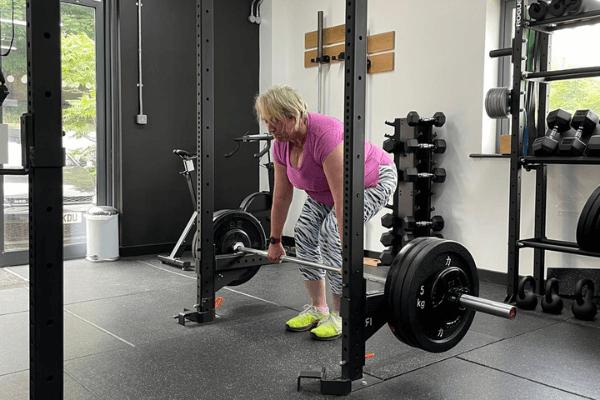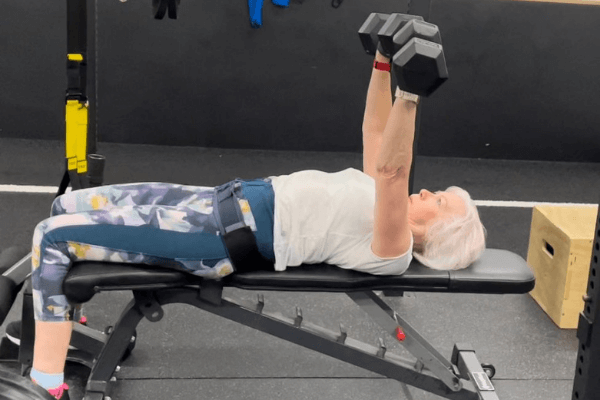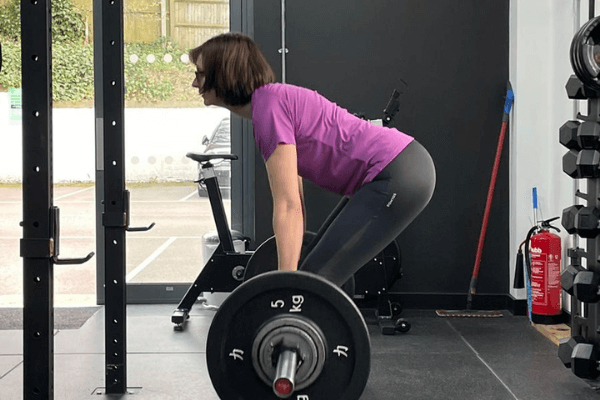

Deadlifts, dumbbells and the menopause...
Three words you would not expect to appear in the same sentence and be associated with each other.
One question we hear often from women in their 40's and 50's is, "how is lifting weights good for me during the menopause?"
Or more specifically, is Strength Training beneficial for menopausal women?
In short, the answer is a resounding, "yes, absolutely!"
My hope is that by the end of this blog, you will be armed with the specific knowledge of the benefits of strength training for menopausal women.
But before we dive into the reasons why strength training is highly beneficial for menopausal women, we firstly need to understand what happens to a woman's body during the menopause.
The menopause is part of the natural ageing process & usually occurs between the ages of 45-55 years of age. It happens due to a woman's oestrogen levels declining.
Symptoms include:
- Hot flushes
- Night sweats
- Difficulty sleeping
- Low mood/ anxiety
- Reduced sex drive
- Problems with memory & concentration
(Source: NHS)
The impacts of low oestrogen and the onset of the menopause can impact other areas including:
- An increase in fat mass (weight gain)
- A decrease in muscle mass
- A reduction in strength
- Lower bone density
- An increased risk of falls
- A reduction in 'functional performance' - everyday tasks can become more difficult
Now I know this sounds like grim reading but let me be clear by saying that all is not lost. There is something you can do it about it. Something that I firmly believe in.
After studying extensively at University during my Sport & Exercise Science degree - learning about the physiology and reasons behind these changes in women and how that impacts their bodies - and my experience of working as a Personal Trainer with women for the last 8 years and seeing how it affects them first-hand, it is clear to see the unpleasant effects of the menopause.
This is why I feel so strongly about putting some positive information out there pertaining to the benefits of Strength Training and how it can mitigate the negative impacts of the menopause from a health and lifestyle perspective.
Strength training - often referred to as resistance training - can simply be defined as activities that make the body stronger.
Strength training is not just about lifting weights. It is more than that.
Bodyweight, resistance bands, suspension trainers, plyometrics, free weights (dumbbells, barbells, kettlebells & medicine balls) and machines can all be used to increase strength.
Now that I have explained what strength training is, here are my top three benefits of strength training for menopausal women.

Jackie has increased her deadlift strength from 20kg - 70kg!
1. You get stronger
Strength training improves your ability to contract you muscles and produce force. Therefore, everyday tasks become easier and elicit less fatigue.
Did you know?
Muscle strength has been shown to decline significantly in menopausal women.
A study in the Journal of Clinical Science found a decrease in isometric hand-grip strength and dynamic leg strength by 10% and 9% respectively in middle aged women, 1-3 years after the onset of the menopause. This can reduce your functional performance and make everyday activities more difficult than they were before the menopause.
But fear not, strength training can help you reduce this reduction in strength by improving your ability to recruit your muscles.
How do your muscles adapt to strength training?
Increases in muscle strength occur due to a combination of muscle fibre and neuromuscular adaptations. In short, muscle fibres can both increase in size and become more efficient at producing force.
Importantly, you can achieve higher levels of strength without increasing your muscle size. So please do not worry ladies... strength training is not going to turn you into Pop-eye or the Incredible Hulk anytime soon! But my hope is that once you have read this blog post, you will not actually mind putting on some muscle mass.
How much can I expect to improve my strength after onset of the menopause?
A study published in the Journal of Aging and Health (2009) found that post-menopausal women demonstrated improvements of 39% on the force produced by the legs and a 46% increase on the force of the upper body. That is a fantastic improvement!
Interestingly, the participants trained only three times per week for 24 weeks and their average age was 57-75 years of age. So ladies, it is never too late to start strength training and experience the benefits.
Furthermore, studies show that your tendon and ligament strength improves when exposed to weight-bearing exercise. This can improve your joint stability, joint function and reduce the risk of injury.
Importantly, a study published in the Journal of Bone and Mineral Research (2017) found that high intensity (heavy) resistance exercise has been shown to prevent bone loss, reduce the risk of falls and fractures, and in some cases, contribute to an increase in bone density.
But here's the most interesting thing about this study...
These benefits were shown in menopausal women who trained for just 30 minutes, twice per week! How amazing is that!
So even if you can only train twice per week, you can still benefit hugely from strength training.
My experience tells me that these benefits would be even greater if you were able to increase your training to 45 minutes, three times per week, under the supervision of an experienced coach.
But twice per week would be a fantastic starting point if you were just getting back into exercise and were new to strength training.

Barbara has increased her dumbbell bench press and upper body strength by two times (5kg - 10kg in each hand)!
2. You preserve & build muscle mass
Strength training has been shown to maintain and even build muscle mass in menopausal women.
Did you know?
Muscle mass slowly decreases in women after the 3rd decade of age and this decrease becomes faster for women when they reach the menopause.
Muscle mass loss, known as atrophy, is one of the major contributing factors for a decline in functional performance and strength. This is one of the reasons why everyday activities can become more difficult.
The Journal of Gerontology (2007) reported a decline of 0.6% per year of muscle mass after the onset of the menopause. Simply put, this is equivalent to 6% every decade. This decrease in muscle mass is strongly linked to age, known as 'sarcopenia' as well as other factors relating to the menopause such as a reduction in oestrogen.
Furthermore, another study in the Journal of Gerontology (2003) reported that muscle loss increases to 5% to 10% each decade after the age 50 for both mean and women.
Importantly, there is something that you can do about this.
Strength training has been proven across multiple studies to ward off the effects of muscle loss caused by both age and the menopause.
A study published in the Journal of Sports Medicine and Physical Fitness (2013) found a 1.6% increase in muscle mass in post-menopausal women. The average age was 63 and this increase was shown after 12 months of strength training only twice per week.
So even after one year of training twice per week, significant improvements in muscle mass can be made.
Furthermore, another reason why it is important to maintain and build your muscle mass is that the more muscle mass you lose, the more your metabolism decreases.
This slower metabolic rate can contribute to weight gain when you eat the same amount of calories but don't burn as many. This is due to the fact that muscle is a metabolically active tissue. The more muscle you have (think a sports car with a big engine), the higher your metabolism.
Conversely, the less muscle you have (a car with a small engine), the lower your metabolism and the easier it is to gain fat.
This is why it is really important to maintain your muscle mass to preserve your metabolism.
So, remember the old adage, "use it or lose it" and start strength training as early as possible to protect and build your muscle mass.

Christine has increased her deadlift strength from 12kg - 37.5kg!
3. You get leaner
Strength training has been shown to reduce your body fat percentage and fat mass in menopausal and elderly women.
Did you know?
A study published in the International Journal of Sports Medicine (2010) has shown that the menopause can lead to an increase in intra-abdominal fat (fat around your organs known as visceral fat), an increase in total body fat mass and body fat percentage, and a decrease in fat-free mass.
There is something that you can do about this too.
Strength training has not only been shown to increase your muscle mass but also decrease your fat mass and body fat percentage.
A study published in Medicine & Science in Sports & Exercise (2002) found a significant decrease in fat mass of 1.7kg and a significant decrease in intra-abdominal fat (131cm to 116cm2) in women after just 25 weeks of strength training. This is truly incredible!
These benefits were experienced after performing only two sets of 10 repetitions, three times per week and the average age of the women participating in the study was between 61-77.
As you can see, the benefits of strength training for menopausal women goes way beyond being able to lift more weights, faster.
Even in your 50's, 60's or 70's, all is not lost. It is never too late to start exercising and experience the powerful benefits of strength training.
Coach Alex
-------------------------------------
Do you want to make Strength Training a part of your lifestyle but don't know where to start? Try our 30-Day Trial here.
N.b. Please seek medical advice and speak to your doctor before taking part in physical exercise. This blog does not constitute medical advice.
------------------------------------
P.S. Surely, I need to run or do more cardio exercise?
Whilst going for a run and doing "cardio" is highly beneficial for your cardiovascular health and improving your fitness. This type of exercise will not significantly impact your strength and muscle mass as a whole.
So please don't think that we are all about just lifting weights. Cardio is fantastic too and I strongly believe that both should be used to improve your health and as part of your overall exercise regime.